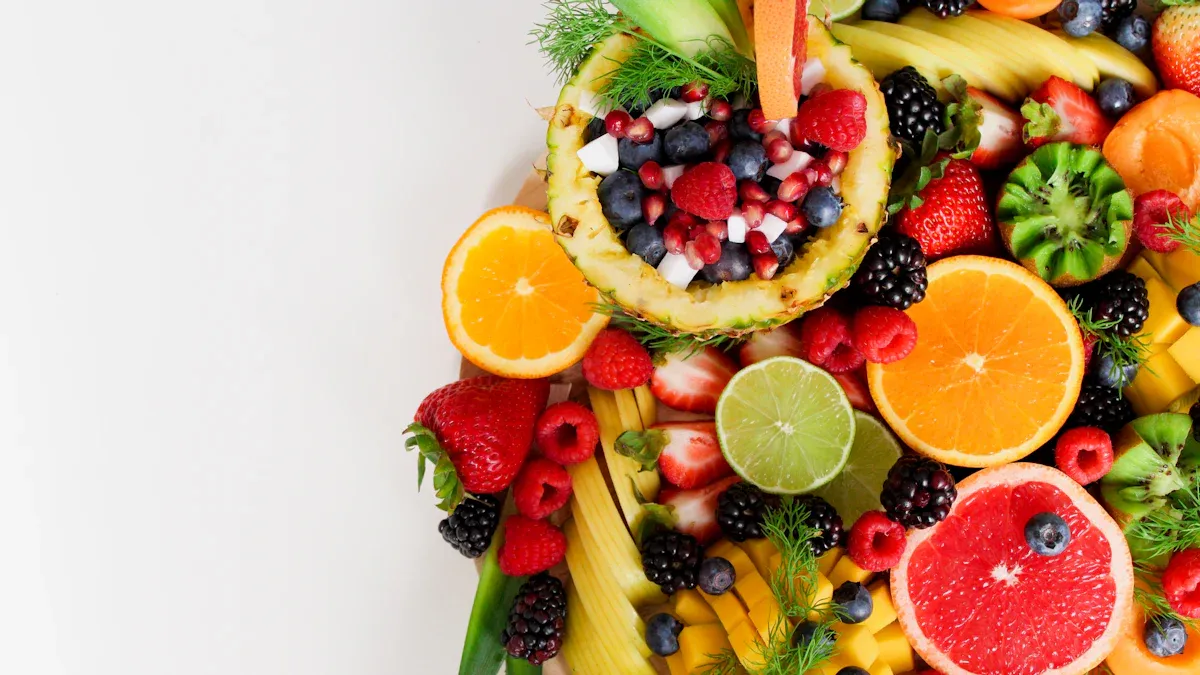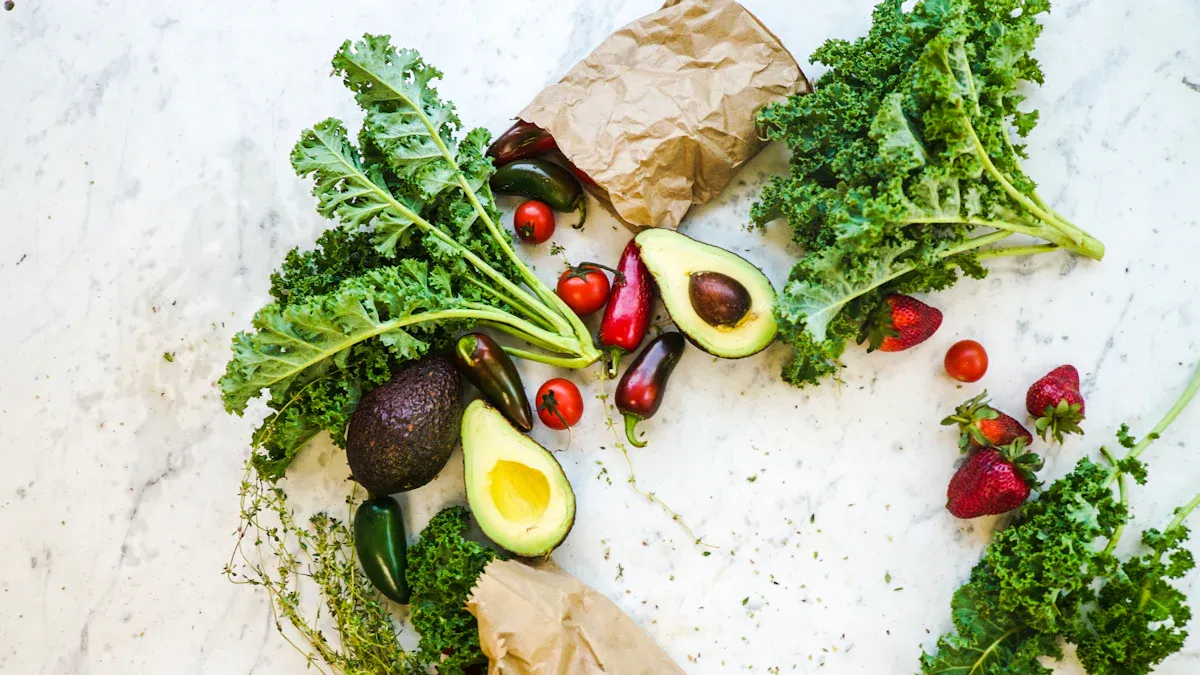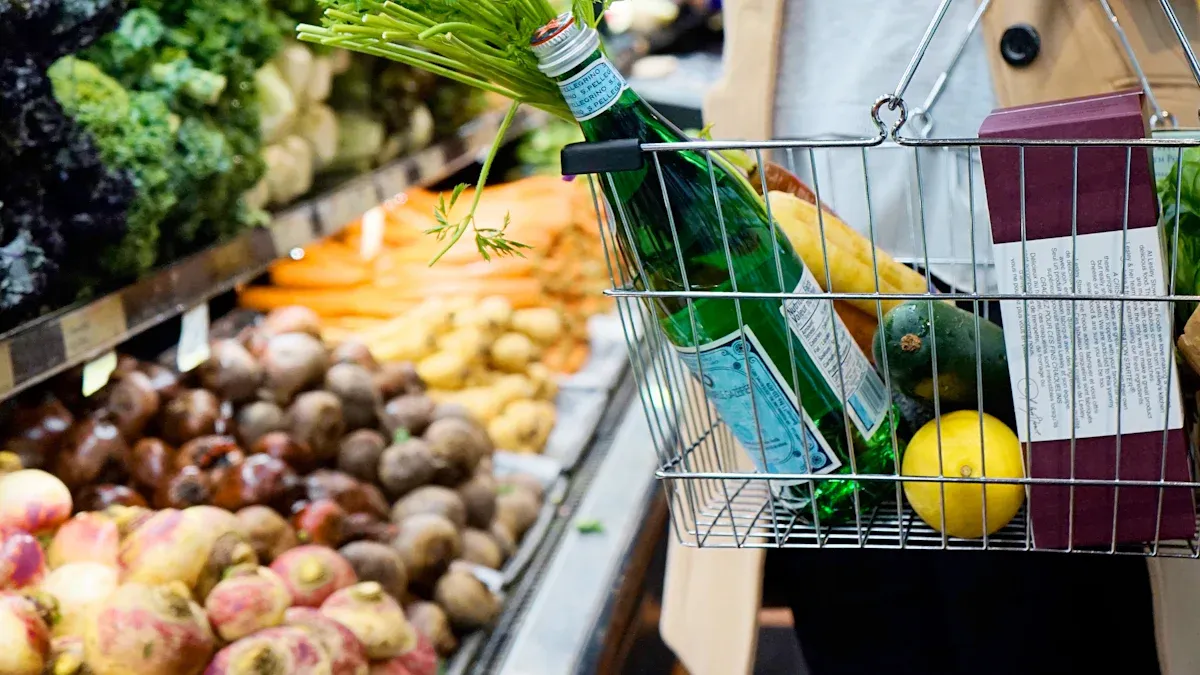How to Select Cancer-Preventive Foods at Your Local Grocery Store

Did you know that what you eat can play a big role in reducing your cancer risk? Research shows that following a healthy diet can lower your chances of developing cancer by 10-20%. That’s a significant impact for something as simple as making smarter food choices!
The good news? Learning how to choose cancer preventive foods at the grocery store isn’t complicated. By focusing on colorful fruits and vegetables, whole grains, and healthy fats, you can fill your cart with items that support your health. Small changes in your diet can make a big difference over time.
Key Takeaways
Pick colorful fruits and veggies. Bright ones have antioxidants that protect your cells.
Add whole grains to your meals. Brown rice and quinoa help digestion and may lower cancer risk.
Choose plant-based proteins. Beans, lentils, and nuts are better than red or processed meats.
Eat fewer processed foods. Skip items with lots of sugar and bad fats to stay healthier.
Plan your shopping trips. Make a list of healthy foods to avoid buying junk.
How to Choose Cancer Preventive Foods at the Grocery Store

Fruits and Vegetables
When you’re shopping for fruits and vegetables, think color! Brightly colored produce like berries, spinach, and carrots are packed with antioxidants that help protect your cells from damage. Research shows that antioxidants may reduce the risk of cancer by neutralizing harmful free radicals. For example, laboratory studies suggest that antioxidants can prevent free radical damage, which is linked to cancer development.
Don’t forget cruciferous vegetables like broccoli, cauliflower, and kale. These veggies contain compounds that may help your body detoxify harmful substances. Try adding a mix of these to your cart each week. If fresh options aren’t available, frozen or low-sodium canned versions are great alternatives.
Whole Grains
Whole grains are another must-have when learning how to choose cancer preventive foods at the grocery store. Foods like whole-grain bread, brown rice, quinoa, and oats are rich in dietary fiber, which promotes healthy digestion and may lower the risk of colorectal cancer. Studies have shown that whole grains can reduce fasting insulin levels, a factor linked to cancer risk.
Avoid refined grains and products with added sugars. Instead, experiment with less common whole grains like barley or wild rice. These options not only add variety but also pack a nutritional punch.
Plant-Based Proteins
Plant-based proteins are a fantastic way to fuel your body while reducing cancer risk. Beans, lentils, peas, and tofu are excellent sources of protein and fiber. They’re also low in saturated fat, making them a healthier choice than red or processed meats.
Nuts and seeds are another great addition. Walnuts, almonds, and flaxseeds provide healthy fats and nutrients that support overall health. Keep a small bag of mixed nuts in your pantry for a quick, nutritious snack.
By focusing on these food groups, you can make smarter choices and fill your cart with items that support your long-term health.
Healthy Fats
Healthy fats are essential for your body and can play a role in reducing cancer risk. Adding omega-3-rich foods to your diet is a great way to start. Walnuts, flaxseeds, and salmon are excellent sources of these beneficial fats. Omega-3s have anti-inflammatory properties that may help protect your cells from damage. You can sprinkle ground flaxseeds on oatmeal or toss walnuts into a salad for a simple nutrient boost.
When cooking, swap butter or margarine for olive oil or avocado oil. These oils are rich in monounsaturated fats, which support heart health and may lower cancer risk. The 2020-2025 Dietary Guidelines for Americans recommend getting 20-35% of your daily calories from fats, focusing on polyunsaturated and monounsaturated sources like fish, nuts, and vegetable oils. Limiting saturated fats to less than 10% of your total calories is also advised.
🛒 Tip: Look for cold-pressed oils and wild-caught salmon at the grocery store for the highest quality options.
Some studies suggest that diets high in unhealthy fats, like trans fats, may increase the risk of cancers such as colon, lung, and postmenopausal breast cancer. By choosing healthier fat sources, you can make a positive impact on your overall health.
Foods to Limit or Avoid
Certain foods can increase your cancer risk, so it’s important to limit or avoid them. Processed meats like bacon, sausage, and deli meats are classified as Group 1 carcinogens, meaning there’s strong evidence they cause colorectal cancer. Eating just 50 grams of processed meat daily can increase your risk by 18%. Red meats, such as beef and pork, also show a potential link to colorectal cancer, with a 17% risk increase for every 100 grams consumed daily.
Type of Meat | Association with Cancer Risk | Evidence Level |
|---|---|---|
Processed Meat | Sufficient evidence that it causes colorectal cancer. | Group 1 Carcinogen |
Red Meat | Limited evidence suggesting a positive association with colorectal cancer. | Limited Evidence |
Risk Increase | 18% increase in colorectal cancer risk for every 50g of processed meat consumed daily. | Statistical Data |
Risk Increase | 17% increase in colorectal cancer risk for every 100g of red meat consumed daily (if causal). | Statistical Data |
Sugary drinks and snacks high in added sugars are another category to avoid. These foods can lead to weight gain and inflammation, both of which are linked to higher cancer risk. Approximately 34,000 cancer deaths worldwide each year are attributed to diets high in processed meats, while high red meat diets could be responsible for up to 50,000 cancer deaths annually.
🛒 Tip: Replace sugary drinks with water or herbal tea and choose fresh fruit over candy or pastries for a healthier alternative.
By making mindful choices, you can reduce your intake of these harmful foods and focus on how to choose cancer preventive foods at the grocery store.
Practical Tips for Grocery Shopping
Plan Your Shopping
Planning your grocery trip can make a big difference in choosing cancer-preventive foods. Start by creating a shopping list that focuses on healthy options. Include colorful fruits and vegetables, whole grains, and plant-based proteins. This helps you stay organized and avoid impulse buys.
Stick to the outer aisles of the store. That’s where you’ll find fresh produce, lean proteins, and whole foods. The inner aisles often contain processed items with added sugars and unhealthy fats.
🛒 Tip: Experiment with new ingredients like farro or barley for variety. Replace red and processed meats with beans, lentils, or fish. Swap sugary drinks for water or unsweetened beverages.
Read Food Labels
Reading food labels is one of the best ways to make informed choices. Look for simple, whole ingredients and avoid products with long lists of additives. Pay attention to the nutrition facts panel to check for added sugars, unhealthy fats, and fiber content.
Healthy eating patterns, like those aligned with dietary guidelines, are linked to lower cancer mortality rates. For example, diets low in added sugars and high in fiber can reduce cancer risk. Labels also help you identify whole grains and avoid allergens.
What to look for on labels:
Calories and added sugars.
Fiber content to support digestion.
Ingredients like whole grains or natural oils.
📊 Did you know? Diets that follow healthy eating indices can lower cancer mortality risk by up to 27%.
Choose Fresh or Frozen Options
Fresh produce is always a great choice, especially when it’s in season. Seasonal fruits and vegetables are often more affordable and packed with nutrients. However, frozen options are just as good—and sometimes even better.
Frozen fruits and vegetables are picked at their peak ripeness and frozen shortly after harvest. This process locks in nutrients, making them a convenient and nutritious alternative to fresh produce.
Type | Nutrient Retention |
|---|---|
Fresh Produce | Nutrient levels can drop after 3 days of storage. |
Frozen Produce | Nutrients remain stable after freezing, often surpassing fresh produce stored for days. |
🥦 Tip: Stock up on frozen broccoli, spinach, or berries for quick, healthy meals. They’re easy to use and last longer than fresh produce.
By planning ahead, reading labels, and choosing the right options, you can make grocery shopping a powerful tool for cancer prevention.
Avoid Processed Foods
Limit pre-packaged meals and snacks
Processed foods might be convenient, but they often come with hidden risks. Many pre-packaged meals and snacks are loaded with unhealthy fats, added sugars, and preservatives. These ingredients can contribute to inflammation and weight gain, both of which are linked to a higher risk of cancer.
You should aim to limit foods like frozen dinners, chips, and sugary granola bars. Instead, focus on preparing simple meals at home. For example, swapping a store-bought snack for a handful of nuts or fresh fruit can make a big difference. Studies from organizations like the World Cancer Research Fund and the American Cancer Society emphasize the importance of reducing ultra-processed foods in your diet.
🛒 Tip: When you’re shopping, check the ingredient list. If you see a long list of additives or words you can’t pronounce, it’s probably best to leave it on the shelf.
Focus on whole, minimally processed options
Whole, minimally processed foods are your best bet for a healthier diet. These include fresh fruits and vegetables, whole grains, and lean proteins like fish, poultry, and beans. Unlike processed foods, these options are packed with nutrients that support your body and may help lower cancer risk.
Research highlights the dangers of processed meats like hot dogs, bacon, and deli meats. The World Health Organization (WHO) classifies processed meats as carcinogenic, with studies showing that eating just 50 grams daily increases colorectal cancer risk by 18%.
Study/Source | Findings |
|---|---|
World Cancer Research Fund | Ultra-processed foods linked to increased cancer risk and other diseases. |
WHO | Processed meat consumption raises colorectal cancer risk by 18% per 50g daily. |
American Cancer Society | Recommends choosing fish, poultry, and beans over red and processed meats. |
By focusing on whole foods, you can avoid harmful additives and enjoy meals that nourish your body. Try building your meals around fresh ingredients like leafy greens, quinoa, and lean proteins. Not only will this reduce your cancer risk, but it’ll also leave you feeling more energized and satisfied.
🍎 Note: Small changes, like replacing processed snacks with whole foods, can have a big impact on your health over time.
Incorporating Cancer-Preventive Foods into Your Diet

Meal Planning
Meal planning is a simple way to incorporate cancer-preventive foods into your daily routine. Start by centering your meals around vegetables and whole grains. For example, you can build a hearty grain bowl with quinoa, roasted vegetables, and a drizzle of olive oil. Whole grains like brown rice and barley not only add variety but also provide fiber, which supports digestion and reduces the risk of colorectal cancer.
Batch cooking can save you time and help you stick to your healthy eating goals. Prepare large portions of roasted vegetables, soups, or whole grains at the start of the week. Store them in airtight containers for quick, nutritious meals. This strategy ensures you always have cancer-preventive options on hand, even on busy days.
🥗 Tip: Aim for at least 2½ to 3 cups of vegetables and 1½ to 2 cups of fruit daily, as recommended by the American Cancer Society.
Easy Recipes
Cooking cancer-preventive meals doesn’t have to be complicated. A vegetable stir-fry is a quick and delicious option. Toss broccoli, carrots, and bell peppers in a hot pan with tofu or lean chicken. Add a splash of low-sodium soy sauce for flavor. Broccoli, in particular, contains compounds that may protect against certain cancers.
Another easy recipe is a hearty salad. Combine leafy greens, quinoa, and a handful of nuts like walnuts or almonds. Top it with a simple olive oil and lemon dressing. This meal is packed with fiber, healthy fats, and cancer-fighting nutrients like polyphenols and flavonoids.
🍅 Fun Fact: Processed tomato products, like tomato sauce, are rich in lycopene, which may help fight prostate cancer.
Healthy Snacks
Healthy snacks can keep you energized and support your cancer prevention goals. Fresh fruit, nuts, and seeds are excellent choices. For example, grapes are rich in resveratrol, a compound that may help prevent cancer. Nuts like almonds and walnuts provide healthy fats and essential nutrients.
If you enjoy DIY snacks, try making homemade trail mix. Combine unsalted nuts, seeds, and dried fruits for a nutrient-packed option. You can also prepare energy bars using oats, flaxseeds, and a touch of honey. These snacks are not only delicious but also help you avoid processed options high in added sugars.
🥜 Tip: Fill two-thirds of your plate with vegetables, whole grains, fruits, and beans to maximize cancer-preventive benefits.
Dietary Factors | Findings | Implications |
|---|---|---|
Plant-Based Foods | Rich in cancer-fighting molecules like polyphenols and flavonoids. | Suggests specific foods that may help in cancer prevention. |
Fiber-Rich Foods | Linked to lower risks of colorectal, breast, and prostate cancers. | Highlights the importance of fiber in cancer prevention. |
By planning meals, trying simple recipes, and choosing healthy snacks, you can make cancer-preventive eating a natural part of your lifestyle.
Making informed choices at the grocery store can significantly reduce your cancer risk. By focusing on a variety of fruits, vegetables, and whole grains, you’re giving your body the nutrients it needs to stay healthy.
Studies show that:
Eating a colorful mix of produce supports cancer prevention.
Whole grains promote digestion and reduce cancer risk.
Avoiding processed foods aligns with long-term health benefits.
Start small. Add one or two cancer-preventive foods to your cart each week. You have the power to take control of your health—one mindful shopping trip at a time.
FAQ
What are the best fruits and vegetables for cancer prevention?
Focus on colorful options like berries, spinach, and carrots. These are rich in antioxidants that protect your cells. Cruciferous vegetables like broccoli and kale are also great choices because they contain compounds that help detoxify harmful substances.
🥦 Tip: Aim for a rainbow of colors in your cart for maximum benefits!
Can frozen fruits and vegetables be as healthy as fresh ones?
Yes! Frozen produce is picked at peak ripeness and quickly frozen to lock in nutrients. In some cases, it may even retain more nutrients than fresh produce stored for several days.
❄️ Note: Stock up on frozen options like spinach or berries for convenience and nutrition.
How can I avoid hidden sugars in packaged foods?
Check the ingredient list for terms like "high-fructose corn syrup" or "cane sugar." Look at the nutrition label for "added sugars." Choose products with simple, whole ingredients and minimal sweeteners.
📊 Pro Tip: Foods with 5 grams or less of added sugar per serving are better choices.
Are plant-based proteins better than meat for cancer prevention?
Yes, plant-based proteins like beans, lentils, and tofu are lower in saturated fat and packed with fiber. These qualities make them healthier than red or processed meats, which are linked to higher cancer risks.
🌱 Fun Fact: Swapping meat for plant-based proteins just a few times a week can make a big difference!
Should I completely avoid processed foods?
You don’t have to eliminate them entirely, but limiting processed foods is key. Many contain unhealthy fats, added sugars, and preservatives that increase cancer risk. Focus on whole, minimally processed options instead.
🍎 Reminder: Fresh fruits, vegetables, and whole grains are always better choices for your health.
See Also
An In-Depth Overview of Various Cancer Types
Recognizing Symptoms and Causes of Esophageal Cancer
Exploring Symptoms and Treatment Options for Duodenal Cancer
Identifying Symptoms and Causes Associated with Anal Cancer
Comprehending Symptoms and Causes Related to Laryngeal Cancer

